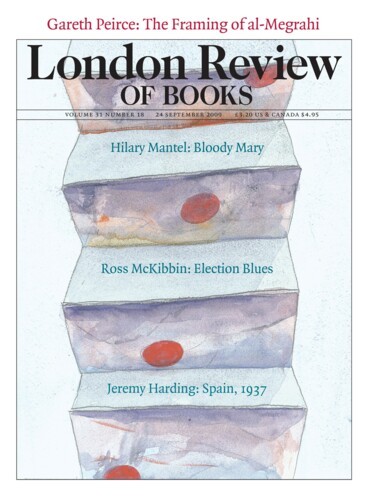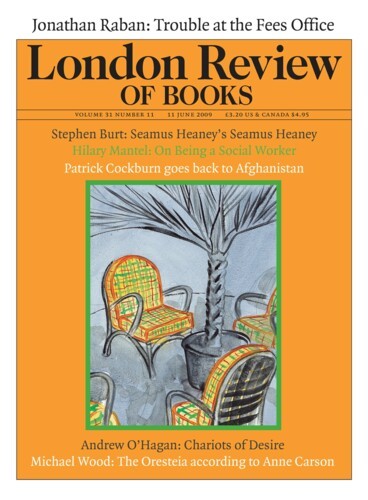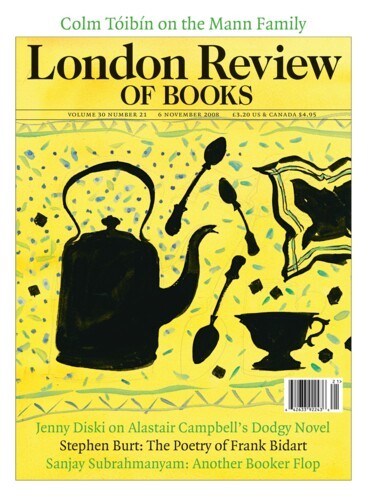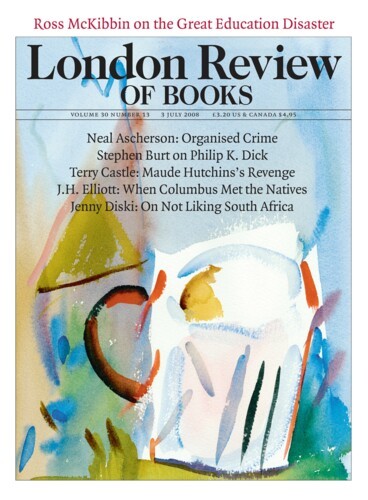A year ago US healthcare reform seemed inevitable: no one knew whether it would include a public option (a government-backed competition with private insurers), or how much it would try to control costs, but all the smart money expected that some plan to insure America's uninsured, or at least many of them, would go through. Eight weeks ago the smart money went the other way: Republican Scott Brown's surprise election to the Senate not only killed the Democrats' Senate supermajority, but spooked already nervous Democrats in the lower house so badly that it seemed they would not, could not take the necessary votes.
Stephanie Burt
Stephanie Burt is a poet and professor of English literature at Harvard. She is the author of Randall Jarrell and His Age, The Art of the Sonnet and After Callimachus, a selection of translations, some of which were first published in the LRB. Advice from the Lights, a collection of poems, came out in 2017. Her book about Taylor Swift, Taylor’s Version, is due in October.
Olallieberries: D.A. Powell’s poems
Stephanie Burt, 24 September 2009
The first collection published by D.A. Powell, Tea (1998), looked oddly like a smart restaurant menu: Wesleyan University Press manufactured a shiny, green and gilt hardback, six inches tall and nine inches wide, to accommodate Powell’s very short poems and very long lines. The promise the cover gave was borne out inside, where those long lines flaunted multiple midline stops, unruly...
A Bit Like Gulliver: Seamus Heaney’s Seamus Heaney
Stephanie Burt, 11 June 2009
It must feel odd – and more than a bit unsettling – to realise that sooner or later, perhaps in your lifetime, somebody will write your biography. Biographers can get lives badly wrong; and even when they get things right, giving attentive accounts with the salient facts in order, they may leave out friendships and discoveries that contributed greatly to a writer’s inner...
Burn Down the Museum: The Poetry of Frank Bidart
Stephanie Burt, 6 November 2008
It is almost always better for a good poet to be recognised than to remain obscure. And yet it might well frustrate a good poet – and it ought to frustrate his readers – when he gets recognised for the wrong things. Frank Bidart first became famous in America (famous, that is, as American poets go) for the grisly violence of his dramatic monologues, for his poems’ unusual...
Kick over the Scenery: Philip K. Dick
Stephanie Burt, 3 July 2008
When an art form or genre once dismissed as kids’ stuff starts to get taken seriously by gatekeepers – by journals, for example, such as the one you are reading now – respect doesn’t come smoothly, or all at once. Often one artist gets lifted above the rest, his principal works exalted for qualities that other works of the same kind seem not to possess. Later on, the quondam genius looks, if no less talented, less solitary: first among equals, or maybe just first past the post. That is what happened to rock music in the late 1960s, when sophisticated critics decided, as Richard Poirier put it, to start ‘learning from the Beatles’. It is what happened to comics, too, in the early 1990s, when the Pulitzer Prize committee invented an award for Art Spiegelman’s Maus. And it has happened to science fiction, where the anointed author is Philip K. Dick.
Pieces about Stephanie Burt in the LRB
Toolkit for Tinkerers: The Sonnet
Colin Burrow, 24 June 2010
Sonnets have no rival. They’ve been written about kingfishers, love, squirrels, the moon (too often), God, despair, more love, grief, exultation, time, decay, church bells beyond the stars...
Read anywhere with the London Review of Books app, available now from the App Store for Apple devices, Google Play for Android devices and Amazon for your Kindle Fire.
Sign up to our newsletter
For highlights from the latest issue, our archive and the blog, as well as news, events and exclusive promotions.





